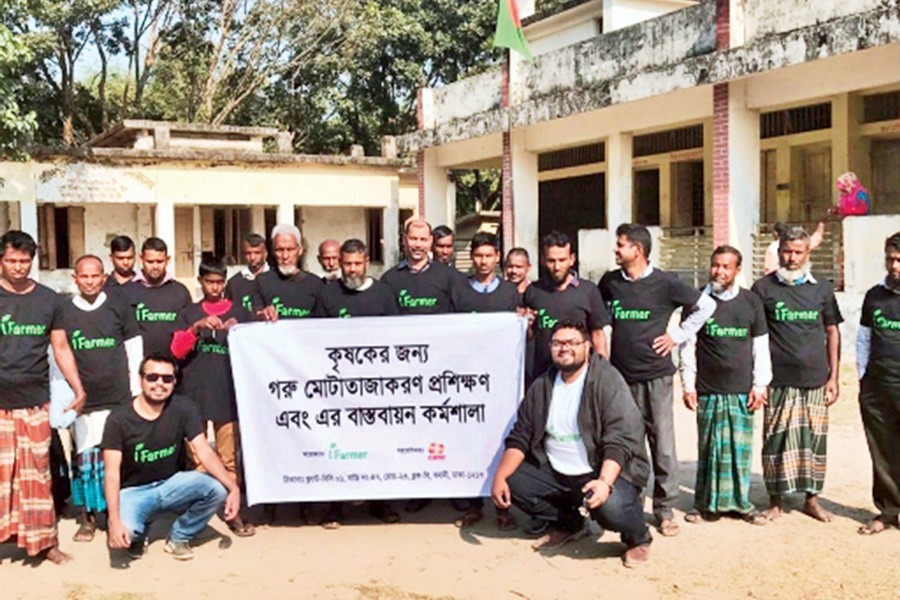The world celebrated World Food day on October 16. According to Food and Agriculture Organization (FAO), by 2050 the world population will be nine billions. Bangladesh will have an estimated population of 250 millions. How are we going to feed this huge number of people? Food production will need to increase by 70 per cent, which is not easy. Only in Asia there are 450 million smallholders who grow more than half of what the world consumes. Like most smallholder farmers around the world, farmers in Bangladesh also deal with three major challenges.
Almost 80 per cent of the farmers in Bangladesh are smallholders and 70 per cent of them do not have any access to formal banking. They have to rely on personal savings, and loans with interest rate of as high as 110 per cent from informal moneylenders. Microfinance is an available option but it is often not very well suited for farming activities with weekly or monthly repayment schedules. Lack of access to appropriate finance discourages farmers to invest in better quality inputs and often encourages them to undertake malpractices to increase their outcome.
Most farmers also lack updated knowledge and information about smart agriculture practices and new technologies to improve farm productivity and yield. Lastly, the exploitative nature of the middlemen also causes farmers to incur loss and at times they have to sell well below their production cost. In 2018, the retailers sold potatoes in Dhaka at Tk 15-20 per kg that were sold at the local markets in Bogura at Tk 2.5 per kg. This is mostly due to the inefficient and unorganised supply chain and the exploitative nature of the local traders. Moreover, with increase in manufacturing and service industry, people are moving out to the cities, which means more demand for food but less people to grow it.
This lack of incentive for farming and declining contribution of the agriculture sector in the economy is also reflected in decreasing agriculture land in the country. Currently, the farmers do not have the resources to use the different sorts of advanced technologies and have less incentive to invest further in farming, due to lack of access to markets or exploitative nature of certain market actors. The young generation is already moving out of agriculture. Generally farmers' children are not interested in farming anymore. Bangladesh needs new business models and innovation that could incentivise farming in the country and attract the youth to be part of it. The innovation could come from anywhere, from established companies to startups. But government needs to respond to these innovations and be able to nurture them.
In this context, iFarmer, a startup with growing popularity, is driven towards solving the challenges of the farmers. iFarmer intends to play a crucial role to help the farmers of our country through an innovative investment model. iFarmer is giving the middle income population in the country a unique chance to be part of farming and share the life of a farmer in Bangladesh. It is a digital platform that connects individual and institutions with farmers through a sponsorship package to fund farming and agriculture for a share of the returns. They also train farmers on smart agriculture practices and provide access to markets.
Founded in 2018, the companies' business model is based on profit sharing between the farmers, farm sponsors and iFarmer. This model could enable the farmers to be more motivated to invest in better inputs and farming practices to ensure better return. Such model of financing is an age-old practice in the country, commonly known as "Barga" or shared cropping.
The revenue model operates on a split system for sponsorships. For example, the sponsors earn principal plus 30 percent for sponsors, 50 percent for farmers, and 20 percent for iFarmer. Since its official launching in July 2018, the company has been working with 1,000 farmers by training them and facilitating finance to selected and verified farmers, attracted sponsorships from more than 150 people for 500 cattles. What makes iFarmer different is that it turns a complex problem into a digital marketplace. They are taking care of access to capital for farmers, training the farmers on smart agriculture practices and providing the market for the farmers to sell. Using a data driven approach iFarmer screens small-scale farmers. Currently they only work with cattle farmers.
They have also been acknowledged for their innovative business model. They won the "Startup with the most Social Impact" award from Swiss Embassy in Bangladesh in 2018, iFarmer also was one of the top five businesses at UNDP Youth COLab, A finalist Echoing Green Social Impact Business 2019 and a winner of UNCDFs Fintech Innovation Fund for Women MSMEs 2019. iFarmer has been incubated by Toru and has partnerships with Startup Bangladesh and CARE International.
Recently the country has seen a surge in the startup ecosystem, thanks to the support of government and private sector. But a closer look will reveal that most of the startups are urban based, service focused, and targeting the growing middle-income population of the country. However, rising food prices will affect the real disposable income of the urban middle class. If the farmers are not growing enough, then the supply of meat for the beef patty and other ingredients will decrease, resulting in high price of the popular food items such as burgers, which will also affect the business of a food delivery startup that delivers the burger.
In the startup ecosystem that is thriving with new and innovative business ideas, company such as iFarmer stands out, as they are trying to work with farmers and the urban population to bridge the gap between supply and demand.
The writer is currently studying BBA in Independent University. He is also an executive board member at Independent University Bangladesh Debate Club (IUBDC). Email: [email protected]


